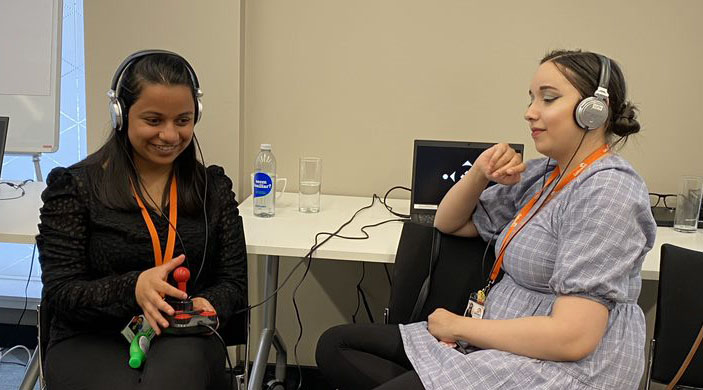Audio-only computer game wins award

Nadia Patel plays the audio game with a joystick controller, while Fatima Rifai listens in via headphones. Both Nadia and Fatima are from Galloway’s Society for the Blind
The first computer game without visuals, designed with people who are blind or partially sighted, has scooped a prize. The player is guided by abstract noise alone through 16 levels of an immersive maze. There is no screen and no voices. The project won the Inspire award from Visionary, the national organisation for local sight loss charities.
A team of researchers from Lancaster University worked with Sight Advice South Lakes to recruit blind and partially sighted gamers to test the prototype. Their feedback will shape an improved version, to be released on the Steam platform.
Fiona Sandford, Visionary chief executive, said: “The project was an inclusive collaboration, with smaller sight loss organisations contributing to a change in approach to design for blind and partially sighted people.
“It was a fantastic demonstration of how bringing diverse voices to any design problem can be transformational. Even better, it creates a much-needed income stream as any money made will also be shared with the sight loss organisations.”
Dr Joseph Lindley of researchers ImaginationLancaster, who created the game, said the players “putting their hearts and souls into helping us understand the problem better, and create new possible directions, was a fantastic demonstration of how bringing diverse voices to any design problem can be transformational”.
Tim Ward, assistive technology co-ordinator at Sight Advice South Lakes, said: “We thought the project had huge potential for the world of sight loss so using the Visionary network we opened the research up to visually impaired gamers in the UK, and we had a brilliant response.”
ImaginationLancaster also won a Lancaster University award for the project. The Inspire award was sponsored by Specsavers.